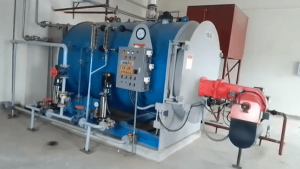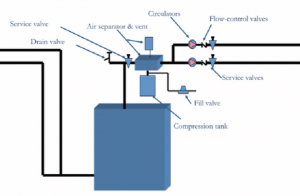Disclosure: As an Amazon Associate, I earn from qualifying purchases. Learn more
Last Updated on September 18, 2023 by Rhyes Frank
Yes, you can insulate a gas water heater. Insulating it can be beneficial for energy savings.
Insulating a gas water heater can lead to energy savings by reducing the amount of heat lost from the tank. This process can help maintain the temperature of the water for a longer duration, reducing the need for the heater to work continuously. While it’s possible to insulate both tank and tankless water heaters, there are some considerations to keep in mind.
Local codes and specific utility company regulations might have restrictions on using insulation blankets on water heaters. It’s essential to check these regulations before proceeding with any insulation work.
For tankless hot water heaters, the insulation process might differ slightly, but the principle remains the same: to reduce heat loss and improve efficiency.
Insulating the pipes of a hot water heater is also a good practice. It can further reduce heat loss, ensuring that the water remains hot as it travels from the heater to the faucet. This step can be especially beneficial in colder climates or during winter months.
In essence, while insulating a gas water heater is generally a good idea for energy conservation, always ensure you’re adhering to local regulations and guidelines.
Related: Are Water Heater Blankets Worth It?
Insulation Necessity for Gas Water Heaters
Gas water heaters, by design, have insulation built into them. This insulation helps in reducing the heat loss from the tank, ensuring that the water remains hot for longer durations.
But over time, the built-in insulation might degrade, leading to increased energy consumption as the heater works harder to maintain the desired temperature. In such cases, external insulation can be beneficial.
By adding an extra layer of insulation, you can enhance the heater’s efficiency, leading to energy savings and prolonged heater life.
Water Heater Insulation Types
There are specific insulation materials designed for water heaters. One of the most common is the water heater insulation blanket. Made from fiberglass and faced with an impermeable layer, these blankets are effective in reducing heat loss.
Another option is foam board insulation, which can be cut and shaped to fit around the heater. Both these materials are designed to withstand the high temperatures of the heater and are safe to use.
It’s essential to choose the right insulation material that fits the water heater model and adheres to local regulations.
how to insulate a gas hot water heater
Insulating a gas hot water heater can lead to significant energy savings by reducing heat loss. Proper insulation ensures that the water remains hot for longer periods, reducing the frequency with which the heater needs to operate. Here’s a step-by-step guide.
Step 1: Choose the Right Insulation Material
Opt for a water heater insulation blanket. These are specifically designed for this purpose and come in various sizes to fit different water heater models.
Step 2: Turn Off the Heater
For safety reasons, ensure the heater is turned off. If it’s a gas heater, set the control to the pilot position.
Step 3: Measure and Cut the Insulation
Measure the height of your water heater and cut the insulation blanket accordingly. Leave the top and bottom of the heater exposed for ventilation.
Step 4: Wrap the Heater
Wrap the insulation blanket around the water heater. Ensure it fits snugly without any gaps. The blanket should overlap at the ends.
Step 5: Secure the Insulation
Use tape or wire to secure the insulation blanket in place. Make sure it’s tight but not overly constricting.
Step 6: Cut Out Areas for Controls and Valves
Using a marker, mark the areas where controls, valves, or the pressure relief valve are located. Cut out these sections so you can access them easily.
Step 7: Insulate the Hot Water Pipes
Using foam pipe insulation, cover the first few feet of both the hot and cold water pipes connected to the heater. This further reduces heat loss.
Step 8: Monitor and Maintain
Regularly check the insulation for any signs of wear or damage. Replace or repair as necessary to maintain efficiency.
Pros and Cons of Insulating Gas Water Heaters
Insulating a gas water heater comes with several benefits. It can lead to significant energy savings by reducing the amount of heat lost from the tank. Proper insulation ensures that the water remains hot for longer periods, reducing the frequency with which the heater needs to operate.
This not only saves on energy bills but also prolongs the life of the heater by reducing wear and tear.
On the flip side, there are some risks to consider. Improper insulation can lead to overheating, especially if the top or bottom of the heater is covered, restricting ventilation. Overheating can damage the heater and even pose a fire risk.
Moreover, local codes and specific utility company regulations might have restrictions on using insulation blankets on water heaters. Always ensure you’re adhering to these regulations and guidelines to ensure safety and compliance.
Common Questions About Insulating Gas Water Heaters
How Much Can I Save by Insulating My Gas Water Heater?
Insulating your gas water heater can lead to energy savings of up to 10%. This percentage can vary based on the age of the heater and the quality of the insulation used.
Is It Safe to Insulate an Older Gas Water Heater?
Yes, but it’s crucial to inspect the heater for any signs of wear or damage. If the heater is in good condition, insulation can be beneficial. Always consult a professional if unsure.
Can Insulation Affect the Warranty of My Gas Water Heater?
Some manufacturers might have specific guidelines about external modifications. It’s wise to check the warranty terms before adding insulation.
How Often Should I Check or Replace the Insulation?
Inspect the insulation annually for signs of wear, damage, or moisture. Depending on its condition, you might need to replace it every 3-5 years.
Are There Eco-Friendly Insulation Options Available?
Yes, there are eco-friendly insulation materials like wool or recycled denim that can be used for water heaters, offering both efficiency and sustainability.
Will Insulation Impact the Performance of My Gas Water Heater?
Proper insulation can enhance the performance by reducing heat loss. However, improper installation might hinder the heater’s efficiency.
Can I DIY the Insulation Process or Should I Hire a Professional?
While many homeowners opt for a DIY approach, hiring a professional ensures the insulation is correctly and safely installed, especially if you’re unfamiliar with the process.
Conclusion
Insulating a gas water heater can be a wise decision for homeowners looking to enhance efficiency and save on energy bills. By understanding the nuances of the insulation process and being aware of the potential benefits and pitfalls, one can make an informed choice. Always prioritize safety, adhere to local guidelines, and consider consulting a professional for the best results.

